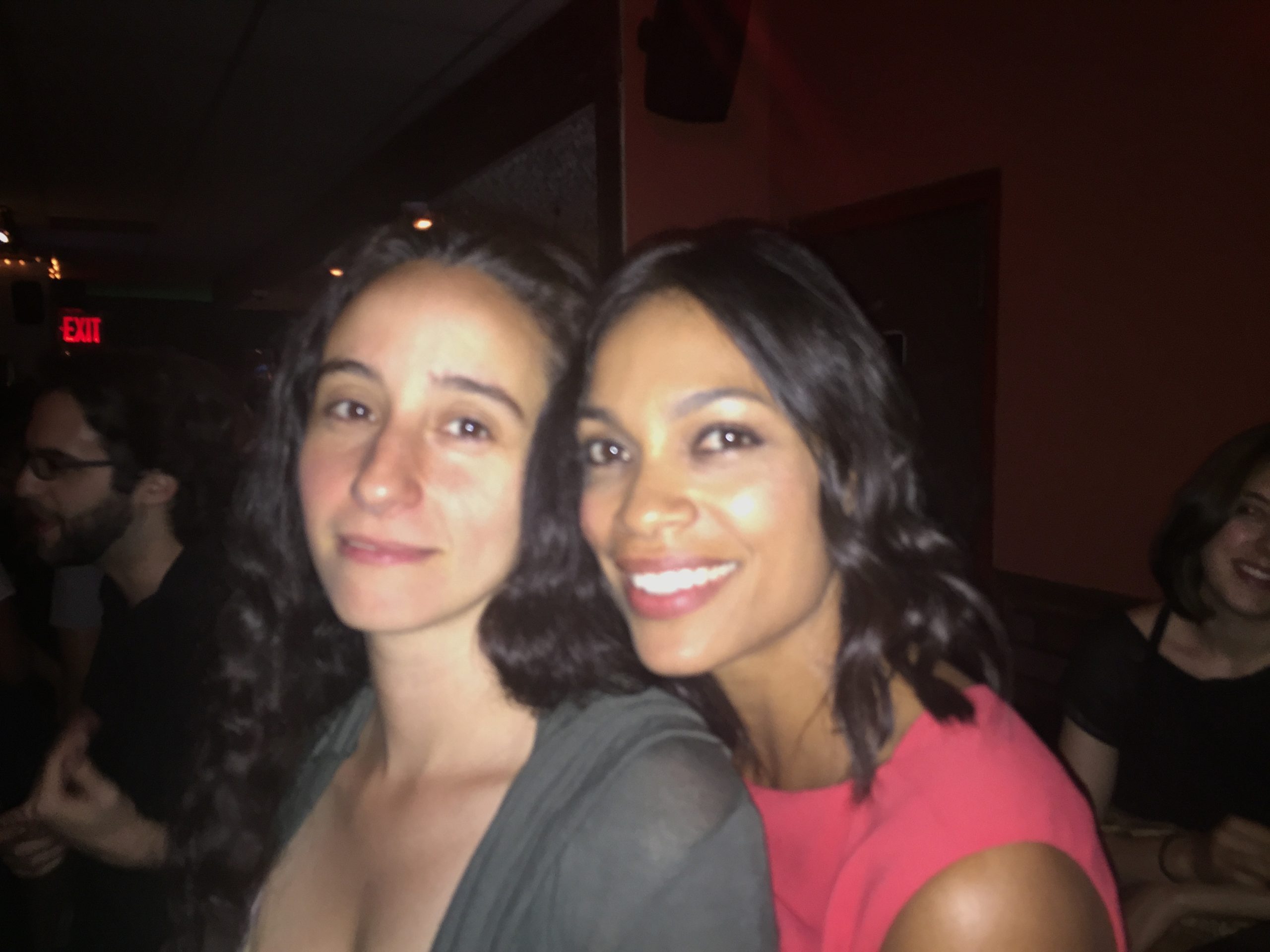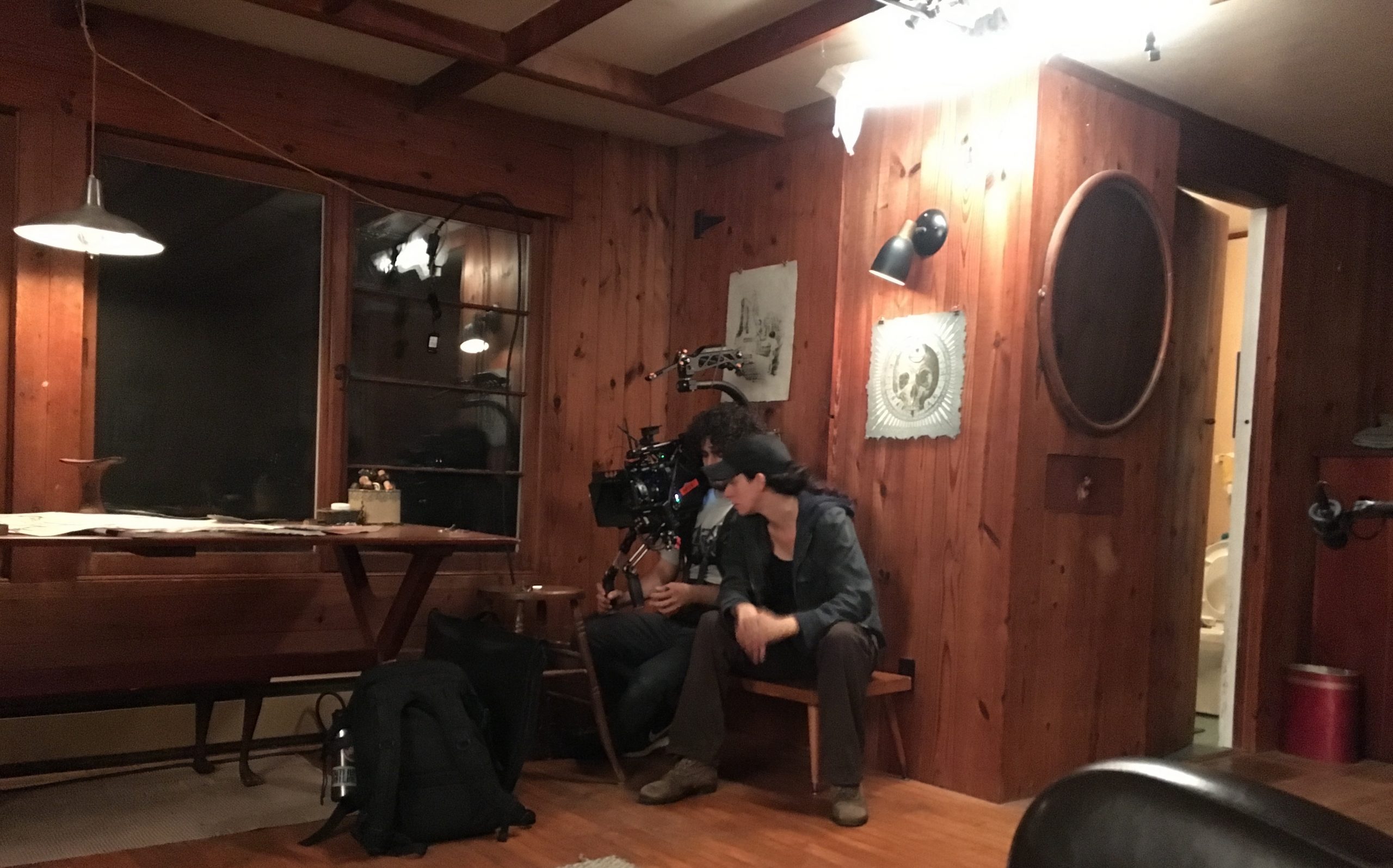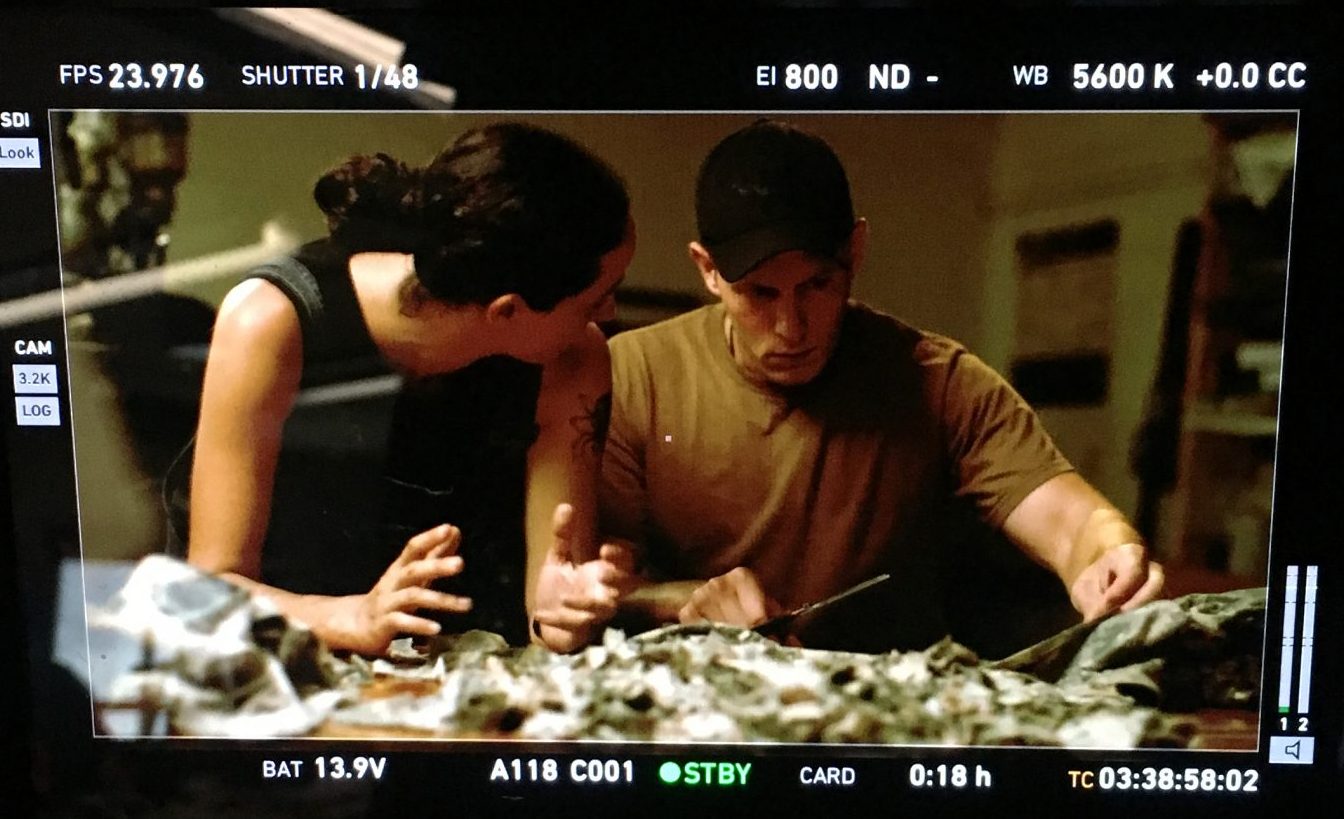Talia Lugacy and Rosario Dawson in Conversation
Checking in on these two filmmakers and their new film, "This Is Not a War Story"
Filmmakers Talia Lugacy and Rosario Dawson have been collaborators and friends for nearly twenty years. From their time as students at The Lee Strasberg Theatre & Film Institute to their most recent collaboration on “This Is Not a War Story,” the two share a singular creative bond that goes beyond the realm of film-making and into the heart of the underlying need to create.
In March 2006, The Independent interviewed the filmmakers about their first collaboration, the feature film “Descent,” which Lugacy wrote and directed and Dawson starred in and produced. For “This Is Not a War Story,” Lugacy wrote, directed, produced, edited and performed, with Dawson serving as Executive Producer.
Now, The Independent revisits the two collaborators, eavesdropping on their ongoing and candid conversation as they share insights into their process of making the critically acclaimed “This Is Not a War Story.”

On Story and Process
TALIA LUGACY: There was a question I got at the Woods Hole Film Festival. Somebody asked about the pauses in the film: “Was this intentional?” We are intentionally reflecting the state of trauma. The pauses, the silences in between the words, the awkwardness and the inability to speak, that unbearable inability to articulate […] and that sense of time being slower than it is. Without these pauses, I reckon it would be a completely different film.
ROSARIO DAWSON: You know you have that a lot, even in “Descent,” with the montages and the quiet. So many people are averse to that and want everything spelled out with music and fast, quick cuts, really trying to manipulate the audience to be in this sense of excitement or agitation, whatever it is. Whereas, we really want to take in someone else’s experience, which is what watching a story unfold before you is and really should be. And you’re seeing it even in documentaries now, everything is so flashy and quick and trying to grab everybody’s attention. And our film does the exact opposite. There’s this other rhythm, a reality that we actually are constantly in that not a lot of people expose in storytelling.
TALIA LUGACY: Yes! There’s this whole other dimension of life’s experience that you almost never see in a film. This is the thing I’m always trying to grapple with, get into a story and into a film—that experiential reality—because you very rarely see it. The representations of trauma that you do see in movies feel so dishonest, because they have nothing to do with how it actually feels. It just makes you feel more alienated because you’re like, well, I do experience trauma, but it ain’t that. I can’t articulate like that, I didn’t heal like that – so what’s wrong with me? It must just be my problem.
On Contemporary Relevance
ROSARIO DAWSON: This film was a long time coming. And the timing of it coming out—not just in relation to the troops coming back home and the end of the endless war in Afghanistan, but with the quarantine and the pandemic, has forced people to inquire about their mental health in a way that we never have, collectively. A film like this speaks to and allows an audience to appreciate having that unfold, connecting to it, having it resonate with you, in that it’s not just about war and soldiers’ PTSD and moral injury.
TALIA LUGACY: That was the jumping off point initially. We’re examining trauma in the context of veterans but the idea is to build the bridge to its universal aspects. I think that this timing is really wild for exactly the reason you’re describing, the now collective idea that there is no normal to go back to. Well, welcome to trauma.”
ROSARIO DAWSON: And having intention behind overcoming trauma that is informed, that isn’t just racing to the next thing or, you know, “Put your best foot forward!” What does that even mean? But this idea of everything’s being questioned right now. To extend our awareness of trauma, to really hear it, really apply it to ourselves—and not just be in that knowledge, be in our box, but live it in our hearts.
TALIA LUGACY: That’s one of the biggest foundational points of the film, the body experience of trauma, because that’s how the fuck I got through it. My experience of therapy was not just yapping. It was understanding how these emotions are functioning in my body, that it’s a storm going through you and how to weather it. It’s part of the intention of the film to be with those ideas and to not talk away the problems. Which, in a way is similar to “Descent.” One of the principles we had before we made the film was the idea that she doesn’t talk about it, because that is the reality for so many people. This idea that in stories about trauma, one has to talk about it and intellectualize it in order to understand it is a highly misunderstood and misrepresented idea.
ROSARIO DAWSON: I think it’s misleading and it makes people feel really bad afterwards. You see this perfect journey of someone within an hour and a half go through this super traumatic experience, but at the end, they figured it all out and they’re going to be good from there on out. How come I don’t get that fairy-tale ending? Because that’s what it is, it’s a fairy tale. It’s not reality at all. And this is going to be a lifelong process, it doesn’t have to be bleak, but what does that look like then, where you accept that—just like this pandemic has shown you—it can get worse and it can keep getting worse. So how do you work with that and still understand and appreciate you don’t have control and you don’t have to control it? You know, learn how to live with and through it in a way that’’s much more conscious and aware, forgiving and accepting.
TALIA LUGACY: “And I think that that very idea is the departure between “This Is Not a War Story” and “Descent,” right? The bleakness of “Descent” was the fucking cloud that I was living under, unable to fathom how in the fuck I would live with this, a trauma I had not even named yet. Whereas, “War Story” was finding the light—not the fairy-tale but the real light that exists, that you can find in other people, that the veterans showed me how to locate in myself.”

On Lugacy’s Choice to Act As Well As Direct
ROSARIO DAWSON: So, you know, we met in acting class.
TALIA LUGACY: (Laughs)
ROSARIO DAWSON: It was really exciting for me to see you really put yourself out there in this way, because you put so much work and time and energy into this. And who better to portray this character than you, alongside these people who you’ve been working with and collaborating for so long? So maybe walk the reader through the journey of how that all came to be.
TALIA LUGACY: I had these two characters in my mind, and I didn’t know who they were. I was just listening to them talk and writing down what I heard. When I discovered they had this common experience between them, of being combat veterans, well, I don’t know anything about that. So I dove in. I read, I researched, and then I got to a point of somewhat confidence where I could reach out. It was a series of giving and receiving, it was trust built over time as far as my constantly questioning: “should I tell this story and do I have a right to?” And the veterans compelling me onward, and the connections we found all over the place with our experiences of coping with trauma. Through that process, it was clear that this character is sort of a side of who I am, that I need to wrestle with. The directing I felt I had a very strong handle on. The writing was risky, but it was fun and it was collaborative. But this acting part of it was where the demons were. And so I committed to that part of it and I prioritized it. I could direct in character, but I could not let the director stomp all over whatever this character needed. That was the private deal I had to make with myself.
ROSARIO DAWSON: You know, I always was so curious because I mean, it all kind of came from like, you walking into the DGA (Directors Guild of America) at 10 years old and being like, I want to be a director. And they’re like, “That’s so cute. You go take an acting class.” And, you know, in all that time since, you always had that tool and that access point of acting that I think so well informed your directing. Everything that you wrote and directed had that heart connection. When I’ve worked with directors who are actors, it is just very palpably different than people who’ve never been on the other side of the camera. Exactly as we’re talking about the evolving of our storytelling, you had evolved over the years, gotten to this point where you’ve done enough work on yourself to be able to get to that place of vulnerability, to be present to it, to work with it and to also perform multiple functions while doing it. Because you could have found someone from this community to play both of these parts, yours and Sam’s.
TALIA LUGACY: I did try.
ROSARIO DAWSON: Talk about making that decision. Because I think that’s what we were getting at before, how much of this process of portraying trauma—whether it’s in writing, acting or directing—is tapping into what trauma does in our bodies and our hearts and our spirits.
TALIA LUGACY: The discovery was this: that having had certain experiences isn’t enough. It doesn’t necessarily prepare you in any way for staying grounded on a complicated film set, with weird shit going on, and all the repetitive aspects. It’s tremendously taxing physically and emotionally. I’m not a social worker, I’m not a therapist. Why would I ask a traumatized person to relive the worst sides of themselves, over and over again, on demand. Is that good? Is that healthy? As I immersed myself in this community I ultimately made the choice not to ask somebody to go through that. The demands of both characters (Talia’s and Sam’s) are far more intense emotionally and fraught psychologically than the real veterans were being asked to relive for the film. I allowed that their contributions would be what they wanted. And me and Sam as actors would suffer through the narrative parts. It’s entirely naive and idealistic to think it’s somehow necessary or even okay to ask a traumatized person to show up at six in the morning and people are fucking with your face and then you have to go in front of this weird mechanism to be yourself, somehow, only to be told, “Can you do that again? Can you do that again? Can you do that again?” It’s a whole mechanical weirdness that you have to be at some level trained to understand and accept and integrate into a performance. All of those things are insurmountable for the average person, let alone someone who’s suffering so deeply on a daily basis just trying to get by. Besides, it utterly disregards the fact that the value and impetus of acting itself is empathy. Acting is empathy. You lose that value entirely when you enforce some bizarre notion of authenticity onto a process as fake as filmmaking—it’s just silly, if not a bit dangerous at times, to do so.
ROSARIO DAWSON: I’ll never forget, when we were shooting my character’s rape scene in “Descent,” and my fellow actor was getting overly engaged. He was really choking me at one point, which was really traumatizing because I’ve actually suffered sexual trauma in my past. I remember he was panicking, and had a whole breakdown over it. I remember I was consoling him and just kept thinking, “I’m consoling my rapist right now.” And so, especially in a project like this, where ultimately finding someone who might have actually had these specific traumas, it could be very triggering and borderline abusive having them be in a situation where we’re trying to manipulate that experience into a performance when it’s not a performance for them. Most of the other people in this project are veterans, but they got to participate in the weight of where they are now with their process, which is taking off those uniforms and cutting them off and turning them into art. We were asking them to be where they are now as opposed to playing with the emotionality that they suffer regularly. It’s this type of cinematic experience that understands where you draw those lines in order to best create the type of story and experience that you’re trying to share with audiences.
TALIA LUGACY: Exactly. These are the kinds of stories that we’re trying to tell. These are the films that are worth making. I know exactly why those decisions were made and I’m not going to make exploitative decisions. We went way above and beyond to populate the film with as many people who have lived the experience as possible and they can have the fun of being in the film, but not the horror of being in it. It was the richness of experience and just being like, we can create here a fabric of experiences where everybody’s had a contribution—that was the gold mine.
ROSARIO DAWSON: Right. And there was the care and consideration, and it’s felt, where you weren’t going to rush to make the film but you were living with it for years. You can feel that in the film. I just feel so grateful of the time and energy and care that was taken into exploring this world and their space and ideas, in such a palpable, personal way that it’s able to resonate. The movie itself wanted to be made, it felt like, for everyone involved—how it was birthed was the way that it needed to be born.
TALIA LUGACY: That’s the achievement of it in my mind, the lovingness that brought it to be. You can make something that way.

On Watching “This Is Not a War Story”
ROSARIO DAWSON: Is there anything in particular that you feel could or should be said for someone who’s going to see this?
TALIA LUGACY: The main thing is the openness to look at it without expectations. A film may not be what you’ve seen before, a film can behave in ways that are not predictable—really it ought to.
ROSARIO DAWSON: And someone who’s already watched it?
TALIA LUGACY: Watch it again! There’s so much in there you can discover.
Since its premiere last spring, “This Is Not a War Story” has played over a dozen festivals with prizes at Urbanworld, Woods Hole, SF IndieFest, Atlanta Underground and Indie Street. Find it on HBO Max and in theaters from WarnerMedia OneFifty as of November 3rd. Dawson and Lugacy are currently collaborating on Lugacy’s next film “Whitey On The Moon” which will also reunite them with “This Is Not a War Story” star and Co-EP Sam Adegoke and the WarnerMedia Project OneFifty team.
To learn more visit www.thisisnotawarstory.com
